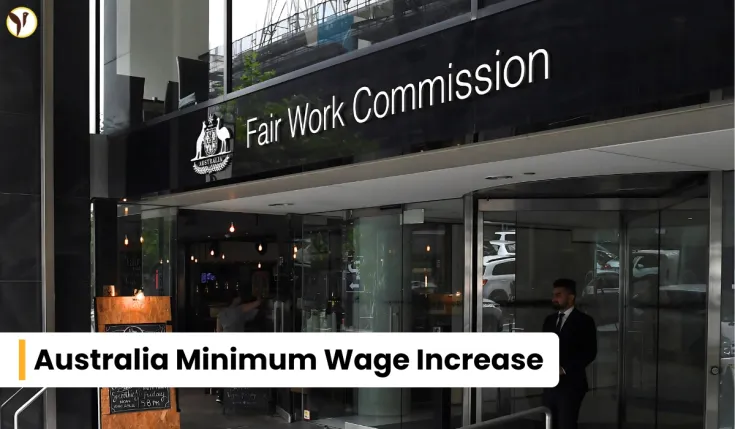Starting July 1, 2025, the minimum wage in Australia is expected to see an increase of 3.5%. This change will increase the minimum wage from $24.10 to $24.95 per hour, which is an increase of approximately $32 per week or $128 per month for full-time workers. The new weekly minimum wage will be $948.
The announcement was made by Australia's Fair Work Commission along with the annual wage reviews as a response to the ever-increasing cost of living and current inflation which stands at 2.4%. This increase in wages is likely to alleviate some pressure of costs although it will help slightly decrease the purchasing power gap due to inflation.
Wage Increase Justification
The Fair Work Commission cited the inflationenary pressures along with cost of living and economic recovery as primary reasons behind the increase.
Moreover, for the workers earning minimum wage, this change represents much more than just figures on a balance sheet. This change will protect up to 1 million Australians releive them from pay stagnation.
A Fair Work Commission spokesperson wrote, “This decision is about ensuring fairness and equity to enable that the lowest paid workers are not left behind.”

Who Benefits from the Change
This increase in wages will impact around 2.9 million Australians, many of whom are working in retail, hospitality, healthcare, and community services sectors. It is important to note that these industries make up a substantial part of Australia’s labor market and have also helped the country during difficult periods such as the pandemic and economic recessions.
For security guard William Seamons, a resident from Victoria, this increase in wages is more than just a few extra bucks. “This increase is awesome and was overdue. It is not just about the money; it is about being appreciated and supported for the work we do,” he stated.
As detailed in the increase guidelines, it is intended that workers will be able to afford groceries, utilities, and rent, while providing some extra cash for a saving.
Worries From the Small Business Community
The increase is a step toward meeting the needs of employees and as welcomed by workers, labor organizations and unions. However, there is skepticism surrounding the impact of the wage increase on small business operations. Some business groups have indicated concern with the possible impact the increase in wage might have on their business operations. For some businesses already struggling with very limited profit margins, an increase in wages would mean an increase in prices of goods for the customers or a reduction in employees.
The Australian Chamber of Commerce and Industry (ACCI) stated that the increase alongside other recent costs may add the burden of trying to keep the business afloat for small businesses.
The case for boosting wages
Supporters of the increase, including the federal government and unions, argue the wage hike is essential for building long-term resilience in the economy. They contend that higher wages enable more consumer spending, which in turn stimulates economic activity and benefits businesses in the long run.

“Raising wages ensures that workers can spend more in their local communities,” said a representative from a prominent union body. “It’s a win-win when businesses and workers thrive together.”
Superannuation Boost Joins the Conversation
Adding to the boost for Australian workers, July 2025 will also see the superannuation guarantee rise to 12 percent. This means workers will not only have more immediate take-home pay but also benefit from increased contributions to their retirement funds. This dual increase is set to bolster both present-day living standards and long-term financial security.
Achieving Equilibrium for the Future
The strike increase encapsulates Australia's continuing attempts to find the equilibrium between economic growth and equity and justice. The Fair Work Commission seeks to ensure that the most disadvantaged, in financial terms, workers are not excluded while trying to build a labor market that is resilient enough to weather the next economic storm.
Advisors regarding the economy have said that increasing productivity will be required, to counterbalance the adverse effects of wage increases. “Sustainable productivity increases will be important to make wage increases sustainable and affordable, especially for small businesses, while not generating inflation”, said one commentator.
A Step Forward
In any event, the July 2025 minimum wage increase represents a step forward in the context of Australia’s workforce. The issues persist, especially for smaller companies, but in any case, it is clear that action is needed to ensure that employees are rewarded meaningfully, in relation to their contribution to the economy not to the society.
With the increased funding of wages and the superannuation, Australians will be seeing higher standards of living as the nation seeks to balance economic equality.
Image Source: News







